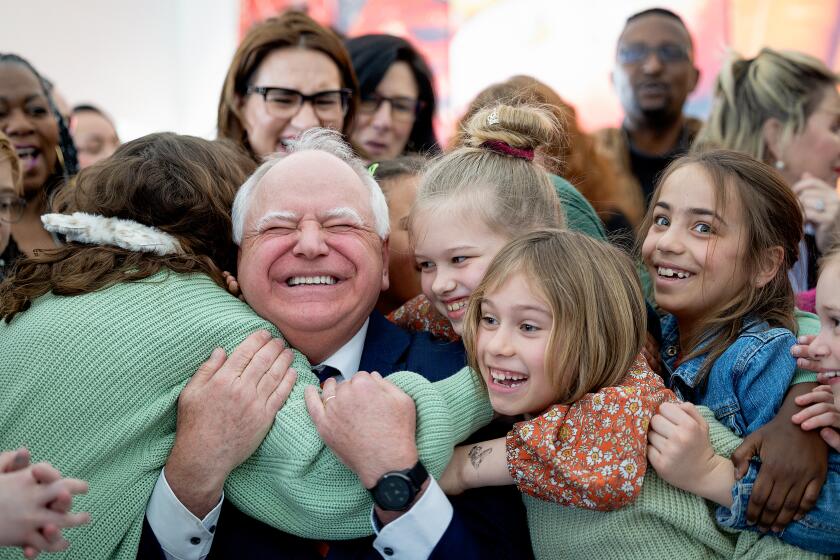Gov.’s Healthcare Summit Reveals Union Divisions
Gov. Arnold Schwarzenegger brought together corporate executives, doctors, medical administrators and academics Monday in what he said was an attempt to find common ground on healthcare policy -- and in the process exposed a divide among organized labor.
The divide was apparent in the differing tones inside UCLA’s air-conditioned Covel Commons, where Schwarzenegger held his “Summit on Health Care Affordability,” and outside in the sweltering courtyard.
Outside, the California Nurses Assn. ran a picket line of 40 people. “Any union leader that crosses is a scab,” said Rose Ann DeMoro, the union’s executive director.
The head of the California Labor Federation, Art Pulaski, recalled last year’s fight with Schwarzenegger over his special election and denounced the governor for not doing more to provide health coverage to Californians.
Inside, the national presidents of three prominent unions -- the Service Employees International Union, the United Farm Workers and the United Brotherhood of Carpenters and Joiners of America -- took seats around a long table with the 50 summit participants, and thanked the governor for convening the session.
(Don Attore, a top staffer of the California Teachers Assn., joined the summit late and spoke during a lunchtime discussion about Schwarzenegger’s proposal, announced Monday, to install new medical clinics in as many as 500 elementary schools.)
The service employees, farm workers and teachers unions have endorsed Schwarzenegger’s opponent, Phil Angelides, who held a healthcare session of his own at UCLA’s Kerckhoff Hall.
“No governor in recent California history has cared less about healthcare or done less to expand and improve it than Arnold Schwarzenegger,” Angelides told the gathering.
Angelides said if elected he would introduce legislation requiring companies with more than 200 employees to provide health insurance. It would, he said, be modeled after a law that California voters overturned in 2004, which required companies to offer insurance or pay fees into a state system that would provide coverage.
In addition, Angelides said he would “force” drug companies to lower their costs and require HMOs to devote more money to healthcare and “not excessive profits and executive pay.” The governor’s campaign said such measures would amount to a multibillion-dollar tax increase on business.
The labor officials said they went to Schwarzenegger’s event because of the urgency of the issue, and not to help him politically.
Arturo Rodriguez, the UFW president, noted that 85% of farm workers lack health coverage. “People’s lives are more important than what the election politics are,” he said.
The divergent opinions reflect a recent split in the American labor movement. While the unions protesting generally side with the AFL-CIO, the three unions whose presidents were inside the Schwarzenegger summit are part of the Change to Win coalition. Change to Win severed ties with the AFL-CIO last year to place greater emphasis on organizing new members.
Andy Stern, the service employees president, said late last week that he saw no contradiction between his union’s strong support for Angelides’ gubernatorial campaign and his participation in the Schwarzenegger summit.
He said the governor should set a deadline for making changes to healthcare and require companies to provide health coverage to employees if they want to do business with the state. Stern, repeating a statement that has been controversial within the labor movement, said that the “employer-based” system of healthcare is dying and should be replaced with universal coverage.
Schwarzenegger paid close attention to his union guests. Stern was seated next to the governor at lunch, and other union leaders were close by.
DeMoro, the executive director of the nurses’ union, which voted last year to join the AFL-CIO, said union leaders who participated in the summit were betraying their labor brethren.
“It’s really shocking frankly, because working people have been hit the hardest by the governor’s healthcare policy,” she said. “It says the right wing has been extremely effective in dividing the labor movement.”
Doug McCarron, the carpenters union president, called the criticism “ridiculous. I want to see bipartisan programs and solutions for American workers.”
Schwarzenegger himself has offered few detailed proposals on healthcare during his nearly three years in elective politics. The governor said Monday he was open to all ideas and ready to begin a thorough examination of healthcare with an eye toward announcing a comprehensive proposal next year if he is reelected.
“I look at this as the first mile of a marathon run,” Schwarzenegger said of the summit.
The discussion covered familiar territory in the national healthcare debate, with the participants offering various reasons for high health costs and the rising number of uninsured Californians -- now estimated at more than 6 million.
There was little mention of administrative and prescription drug costs, often blamed as reasons for rising healthcare costs. Anthony Wright, executive director of Health Access California, a consumer advocacy group that has been critical of the governor’s record on healthcare, told the summit that he found the entire discussion “surreal.”
*
Times staff writer Robert Salladay contributed to this report.
More to Read
Get the L.A. Times Politics newsletter
Deeply reported insights into legislation, politics and policy from Sacramento, Washington and beyond. In your inbox three times per week.
You may occasionally receive promotional content from the Los Angeles Times.









